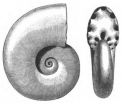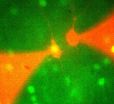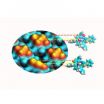(Press-News.org) PITTSBURGH, Jan. 10 – A researcher at the University of Pittsburgh School of Medicine, in collaboration with scientists from the National Institutes of Health (NIH), has discovered that the deadly plaques of Alzheimer's disease interact with certain cellular proteins to inhibit normal signals that maintain blood flow to the brain. Their findings, which could lead to new approaches to treat the dementia, were recently published in Public Library of Science One.
Levels of nitric oxide (NO) – a signaling molecule that helps regulate blood flow, immune and neurological processes – are known to be low in the brains of people who have Alzheimer's disease, but the reason for that hasn't been clear, said study co-author Jeffrey S. Isenberg, M.D., M.P.H., associate professor, Division of Pulmonary, Allergy, and Critical Care Medicine, Pitt School of Medicine.
"Our research sheds light on how that loss of NO might happen, and reveals biochemical pathways that drug discoverers might be able to exploit to find new medicines for Alzheimer's," he said. "There is evidence that suggests enhancing NO levels can protect neurons from degenerating and dying."
The researchers, led by first author Thomas Miller, Ph.D., and senior author David D. Roberts, Ph.D., both of the Laboratory of Pathology in NIH's National Cancer Institute (NCI), found in mouse and human cell experiments that amyloid-beta, the main component of the plaques that accumulate on brain cells in Alzheimer's, binds to a cell surface receptor called CD36, which causes decreased activity of the enzyme soluble guanylate cyclase to reduce NO signaling. But that inhibitory effect required the presence of and interaction with CD47, another cell surface protein, indicating that additional steps in the pathway remain to be identified.
"It's possible that an agent that could block either CD36 or CD47 could slow the progress of neuronal degeneration in Alzheimer's by protecting the production of NO in the brain," Dr. Isenberg said. "Importantly, we have already indentified therapeutic agents that can interrupt the inhibitory signal induced by these interactions to maximize NO production, signaling and sensitivity."
He and his colleagues currently are studying such blockers in a variety of disease models.
Co-authors of the paper include Hubert B. Shih and Yichen Wang, both of NCI. The research was funded by NCI and the Howard Hughes Medical Institute.
###
About the University of Pittsburgh School of Medicine
As one of the nation's leading academic centers for biomedical research, the University of Pittsburgh School of Medicine integrates advanced technology with basic science across a broad range of disciplines in a continuous quest to harness the power of new knowledge and improve the human condition. Driven mainly by the School of Medicine and its affiliates, Pitt has ranked among the top 10 recipients of funding from the National Institutes of Health since 1997 and now ranks fifth in the nation, according to NIH data for 2008 (the most recent year for which the data are final).
Likewise, the School of Medicine is equally committed to advancing the quality and strength of its medical and graduate education programs, for which it is recognized as an innovative leader, and to training highly skilled, compassionate clinicians and creative scientists well-equipped to engage in world-class research. The School of Medicine is the academic partner of UPMC, which has collaborated with the University to raise the standard of medical excellence in Pittsburgh and to position health care as a driving force behind the region's economy. For more information about the School of Medicine, see www.medschool.pitt.edu.
PROVIDENCE, R.I. [Brown University] — The world's oceans are under siege. Conservation biologists regularly note the precipitous decline of key species, such as cod, bluefin tuna, swordfish and sharks. Lose enough of these top-line predators (among other species), and the fear is that the oceanic web of life may collapse.
In a new paper in Geology, researchers at Brown University and the University of Washington used a group of marine creatures similar to today's nautilus to examine the collapse of marine ecosystems that coincided with two of the greatest mass extinctions ...
Research by engineers and cancer biologists at Virginia Tech indicate that using specific silicon microdevices might provide a new way to screen breast cancer cells' ability to metastasize.
An image of their work provided to Biomaterials was selected as one of the 12 best biomaterials-related images published in the journal's 2010 catalogue. http://www.elsevierscitech.com/pdfs/Biomaterials_2010.pdf
The Virginia Tech researchers are: Masoud Agah, director of Virginia Tech's Microelectromechanical Systems Laboratory (MEMS) Laboratory in the Bradley Department of Electrical ...
LEXINGTON, Ky. (Jan. 4, 2011) − Scientists at the University of Kentucky have discovered that plasminogen, a protein used by the body to break up blood clots, speeds up the progress of prion diseases such as mad cow disease.
This finding makes plasminogen a promising new target for the development of drugs to treat prion diseases in humans and animals, says study senior author Chongsuk Ryou, a researcher at the UK Sanders-Brown Center on Aging and professor of microbiology, immunology and molecular genetics in the UK College of Medicine.
"I hope that our study ...
Alexandria, VA – Where to next in the search for oil and gas? EARTH examines several possible new frontiers - including the Arctic, the Falkland Islands, the Levant, Trinidad and Tobago and Sudan - where oil and gas exploration are starting to take hold. One of those places, Sudan, is in the news for other reasons: South Sudan voted yesterday on whether to secede from North Sudan.
But given that South Sudan holds more than 70 percent of Sudan's 5 billion to 6 billion barrels of proven reserves, a lot in this election hinges on oil. If South Sudan does secede, how will ...
PITTSBURGH—Carnegie Mellon University researchers have found that within the brain's neocortex lies a subnetwork of highly active neurons that behave much like people in social networks. Like Facebook, these neuronal networks have a small population of highly active members who give and receive more information than the majority of other members, says Alison Barth, associate professor of biological sciences at Carnegie Mellon and a member of the Center for the Neural Basis of Cognition (CNBC). By identifying these neurons, scientists will now be able to study them further ...
CHAMPAIGN, Ill. – Firms that outsource aspects of their business to a foreign country may profit by saving money, but the practice tends to soften the competition among industry rivals, exacting a hidden cost on consumers, says new research co-written by a University of Illinois business administration professor.
Yunchuan "Frank" Liu says outsourcing hurts society in two ways – it results in lost jobs for workers, and in consumers paying higher prices than they should for goods.
"Outsourcing is a topic that affects just about everyone, and the general consensus is that ...
The mechanism for binding oxygen to metalloporphyrins is a vital process for oxygen-breathing organisms. Understanding how small gas molecules are chemically bound to the metal complex is also important in catalysis or the implementation of chemical sensors. When investigating these binding mechanisms, scientists use porphyrin rings with a central cobalt or iron atom. They coat a copper or silver support surface with these substances.
An important characteristic of porphyrins is their conformational flexibility. Recent research has shown that each specific geometric configuration ...
Instances of cyber bullying continue to make news nearly every day, and while it's recognized as a problem among most school-aged children, a new study published this month in Children & Schools and coauthored by Temple University social work professor Jonathan Singer finds that nearly half of school social workers feel they are ill equipped to handle it.
"School social workers provide more crisis intervention services than any other school staff member – more than counselors, nurses, teachers, or psychologists," said Singer. "As a result, school social workers are a ...
VIDEO:
Researchers at Rensselaer Polytechnic Institute have developed liquid pistons, which can be used to precisely pump small volumes of liquid. Comprising the pistons are droplets of nanoparticle-infused ferrofluids, which can...
Click here for more information.
Troy, N.Y. – A few unassuming drops of liquid locked in a very precise game of "follow the leader" could one day be found in mobile phone cameras, medical imaging equipment, implantable drug delivery devices, ...
Researchers at Nationwide Children's Hospital report a gene therapy strategy that improves the condition of a mouse model of an inherited blood disorder, Beta Thalassemia. The gene correction involves using unfertilized eggs from afflicted mice to produce a batch of embryonic stem cell lines. Some of these stem cell lines do not inherit the disease gene and can thus be used for transplantation-based treatments of the same mice. Findings could hold promise for a new treatment strategy for autosomal dominant diseases like certain forms of Beta Thalassemia, tuberous sclerosis ...





